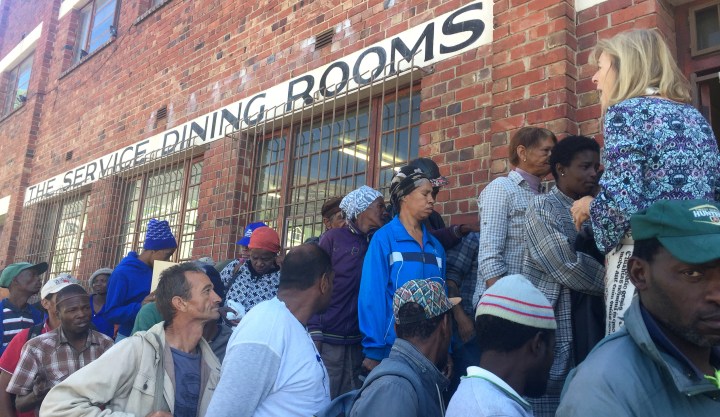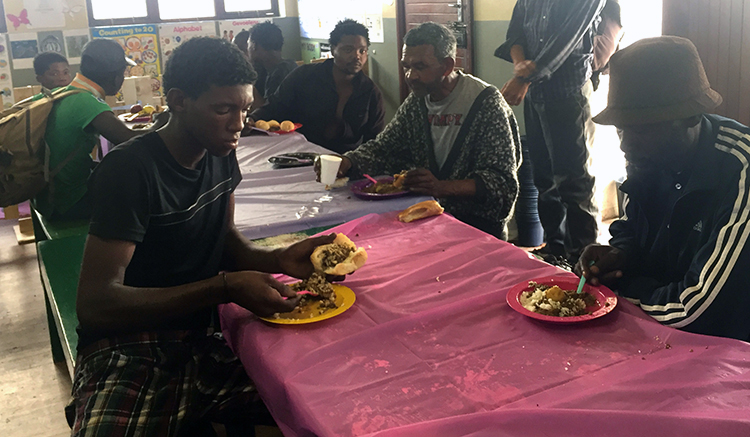HUMANITY
No such thing as a free lunch for Cape Town’s homeless

Each week day, street dwellers young and old line up outside The Service Dining Rooms in central Cape Town for a cheap meal. But their anticipation for lunch to be served is really a wait for much more: they wait on government to deliver on constitutional promises; they hope their parents and family members find employment; and they dream of the eradication of gangsterism from the townships from where they’ve come.
Three youths wait, hungry, on the stoep of The Service Dining Rooms (SDR). As Cape Town bustles around them, they stand mostly still, stuck in the limbo of the line that snakes along the sidewalk. They’re waiting for lunch – their one full meal of the day.
“We eat and then we’ll go back, go to sleep maybe,” says Ayanda Somtaki. She’s 17 and one of the few young women waiting in line. Mostly, she’s surrounded by men who carry their belongings under their arms. Some older women mill about, a few clutching toddlers’ hands.
At 11.30am, SDR will open its doors and offer a plate of food to Somtaki and the 200 or so others who wait with her.
Some will pay the meal’s price of R1, but Somtaki and her friends will instead use a “token” that they got from a homeless support centre down the street called The Carpenter’s Shop. Somtaki is given a small green token if she washes herself and her clothes there in the morning: “You can’t get a token if you didn’t wash,” she explains.

Siyabulela Gqokoma, 23, left, eats his lunch inside The Service Dining Room. Photo: Rebecca Redelmeier
Somtaki has lived in the parks in Gardens since last June. Her brother left her in a park and never came back to get her.
“I didn’t know how to get home, I didn’t have anything.”
She stayed outside last winter, braving the cold and the rain. But this winter, she and her friends plan to find somewhere inside to stay.
Lutho Nqaba stands behind Somtaki and leans against her. He’s 18 and has been on the streets for about a year too. “I’ll go find us a shelter to stay in because it will get very, very cold,” he says. “We’ll get sick if we stay outside.”
The third member of their group, Siyabulela Gqokoma, is the eldest at 23. The three friends have come from different townships around Cape Town and have stayed together on the streets for the last few months. “They protect me,” says Somtaki, looking at the two older boys.
Karen Cain, the operations manager of SDR, opens the kitchen doors just a few minutes past 11.30. “To the back of the line,” she tells latecomers. “Everyone here is equal.”
Once Somtaki makes it inside, she hands in her green token. It clinks together with the rands and the other coloured tokens at the bottom of the collection basket – the orange ones are given to people who use Cain’s Thursday morning clinic to get an HIV or diabetes test; the red ones are given out by government field workers to street dwellers during rounds of the surrounding neighbourhoods; the blue ones are from participants in a mandatory community service programme in the Company Gardens. The green ones from The Carpenter’s Shop are by far the majority.
Today, the meal is a lentil stew served on rice with three rolls and an apple on the side. As people eat inside, the quiet is intermittently disturbed by low murmurs and Cain’s enquiries of “where’s your plate?” and “have you eaten yet?”.
When Gqokoma scores a plate of unwanted leftovers from an older man, Cain shakes her head at him. “It’s one for one for one!”
But Somtaki and her friends need all the food that they can get. They know the network of street dweller support organisations in the area well and have the schedule of times and places where they can find food memorised. It’s a week day, so the only food that they’ll be able to get later is a small hand-out from a local Muslim organisation that gives out bread at 9pm at Grand Parade square.
After that, Somtaki and her friends will return to McKenzie Road Park up the street where they stay. They’ll go to bed hungry and wake up in the morning to repeat the same steps: ablutions at The Carpenter’s Shop, lunch at SDR, and a bit of bread at night.
On the weekends, their schedule changes. Sunday is busy with food provided both at The Carpenter’s Shop and by a church organisation that uses SDR facilities.
But the trio are left to fend mostly for themselves on Saturdays when neither churches nor aid organisations are open. “On Saturdays, we just sleep. We get hungry, so we just sleep,” she said.
According to Cain, her staff of five provide food for more than 700 people each week day. In addition to the meals they serve at SDR, they provide 500 meals to non-profit organisations to distribute in Khayelitsha, Langa, Philippi, Kensington, and Gugulethu. Volunteers often help out for a few days or weeks at a time.
Cain says that she relies on a network of nearby aid organisations to best serve the street dwellers. SDR is united with other non-profit organisations in the area through the Street People’s Forum. “It’s a fantastic network,” said Cain. “You can’t work in isolation. You have to work together.”
Today, for example, a group of young kids stopped by The Service Dining Room.
“I know that they’re from The Homestead,” says Cain, referring to a nearby non-profit that provides residential care to young children living on the streets. “I’ll give them a call and tell them the kids were here.”
For the teenagers who rely on The Service Dining room and surrounding humanitarian organisations for support, returning home is rarely an option.
Somtaki has visited her grandmother and aunt in Gugulethu a few times since her brother first left her in the city, but she always comes back to the streets. She explains that when young people come to the streets “we change, our mind changes”. At home, there is little for her to eat and staying on the streets has become the most appealing option.
But beside her, Lutho and Gqokoma shake their heads. They say they can never return home, even though they know their family misses them. “It’s the gangsterism,” Gqokoma explains.
Such is the struggle of many young street dwellers living in Cape Town. Extenuating home circumstances have forced them to the streets and the camaraderie – which often includes taking illicit drugs – keeps them there. For now, they eat a filling meal at SDR. But the price they pay is more than just the R1 or token that they put in the basket; the cost is coming of age on the streets and, often, a lifetime spent there.
On the upside? At least a tasty meal is available from places like SDR. Before heading out, Somtaki gives a thumbs-up. “It was good!” she says. DM


















 Become an Insider
Become an Insider